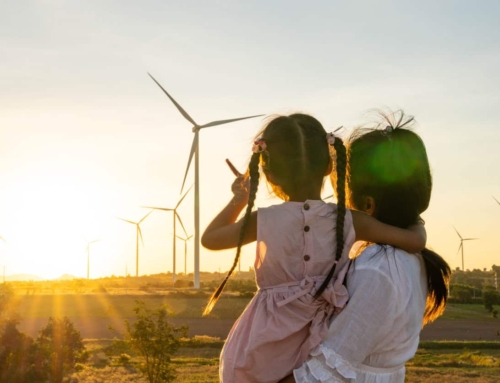Remember when some kid told you that tennis balls had poison gas in them, and if you cut them open you would die? This became a widespread belief, or credo among my childhood friends. A credo may have some elements of truth, or sound true, or it can be totally false. The only way to test the truth in this case was to cut open the ball.
Now a lot of pundits are comparing the similarities of the COVID-19 pandemic and the climate crisis to the extent that it’s already become a credo. There are lots of good reasons for this, but like many credo’s, maybe we should cut open the tennis ball. Maybe what we should worry about is their differences rather than their similarities.
This is the paragraph I’d normally dedicate to the list of reasons by climate activists that claim the pandemic and climate are similar manifestations. You’ve already heard most of them. We are unprepared, we need more central coordination, we must rely on science, the pandemic exposes our injustices, we are in this together. Even I am subject to their charm. Having answers makes us feel like we are in control. But to me they feel eerily hollow. To my inner cynic, they feel like hope, or rationalization, or simply a list of reasons.
This week I heard voices in a well-known climate organization saying, “Surely now they will see the error of their ways and act on the climate crisis. Reason will prevail. Facts will prevail. The way we fight is by adhering to science.” This sounds similar to trying to convince denialists with facts. But if we have learned anything over the last thirty years, reason and facts don’t do much to convince anyone to change behavior, especially with respect to climate change. So here are a few factors in the difference between the pandemic and climate, followed with a few suggestions on how to deal with our messaging.
The first factor is that little, if anything, has happened to human nature over the last three months. We still have all the same cognitive biases. Sure, it is possible to change behavior. The error is assuming that behavior will change simply as a result of the pandemic. We are still ruled by identity, subject to fear and wanting someone to save us. The recency bias will fade as the pandemic gradually gets under control. We’ve seen this in the climate crisis. More people believe it’s happening when there are hurricanes, or droughts or heat waves, but this fades within a period of several years after they pass. Something else will come along that takes our minds off action. Perhaps a depression that makes change “too expensive.”
The second factor is that the momentum of our economic, political systems, as well as systems of power are likely to still be there after the pandemic passes. Fear is an immobilizer. It tends to make people afraid to change and stay with safe options. This includes presidents who promise stability and familiarity. Witness George W Bush’s popularity gain after 9-11. This also includes the ability of 1700 fossil fuel lobbyists in Washington DC to get bailout packages for their clients. It includes continued disenfranchisement of voters and rollbacks of regulation. It’s not fair, but so far no one has mounted a successful challenge or even marched in the streets for a long list of outrageous grievances. I hope the pandemic can do this, but what makes us think that things will change for climate?
The third difference is that the pandemic is an event while the climate crisis is an era… the Anthropocene epoch. The pandemic is a crisis bounded by a shorter time and is likely to go away at some point. The pandemic frame assumes there will be cures and vaccines and the virus can be vanquished quickly. Assuming the same for climate is a mistake, and we should stay away from all the familiar frames of “fighting” the enemy, “waging” war on the virus, or being “victorious.” We should be wary of tying the image of pandemic death to potential climate death. We should be wary of endless fatigue because of the trend seen after WWI and the Spanish Flu to simply not think about it and let loose. Rather we should measure and celebrate progress.
Looking at the downside can be viewed as pessimistic. That’s not my purpose. It’s simply to caution us not to give up. Sometimes it seems the opposition wants us to roll over and die, perhaps, literally. My purpose is also to caution us not to rely on the old methods of messaging. Complaining and trying to use facts to reason people into behavior change won’t work. There are three things that I believe will help.
- In response to the tendency to assume things will change through reason, instead we must tell better stories. The opposition is telling a story. Only if we build bridges by sharing our values of care, empathy, fairness, inclusiveness, justice, strength and family will we change minds. Stories help us do that. We should never list a fact or site a reason when a story will do. (This essay excepted.)
- While complaining and blaming won’t work, there is a villain that needs to be identified and brought up in every story. It is that the old ideas are bankrupt. That we need new ideas. When oil companies or banks say they need bailouts, we can say; no, we’ve tried that before, and the old ideas are bankrupt. This leads to the next step.
- Finally, and as part of telling better stories we need to create a vision of a better future that makes people imagine a better version of themselves. This is the opposite of creating fear by saying that the climate crisis is just the pandemic on steroids, or that we are all going to die. People want to hear a positive vision. This includes identity building in how everyone can help and be part of something bigger than themselves.
We will emerge from this pandemic. The things we do now and the way we communicate will help determine the kind of world we will live in the future. The current occupant of the Whitehouse is a consummate story teller. He is a master of the credo. “No one could have seen this coming.” Let’s cut open a few of his tennis balls as well as a few of our own by telling better stories.
‘We are all connected. Savor the Earth!’™
Hobie,
L. Hobart Stocking
SkyWaterEarth.com
hobart@skywaterearth.com
651-357-0110
Facebook: @SkyWaterEarthConnected
Twitter: @SkyWaterEarth








Leave A Comment